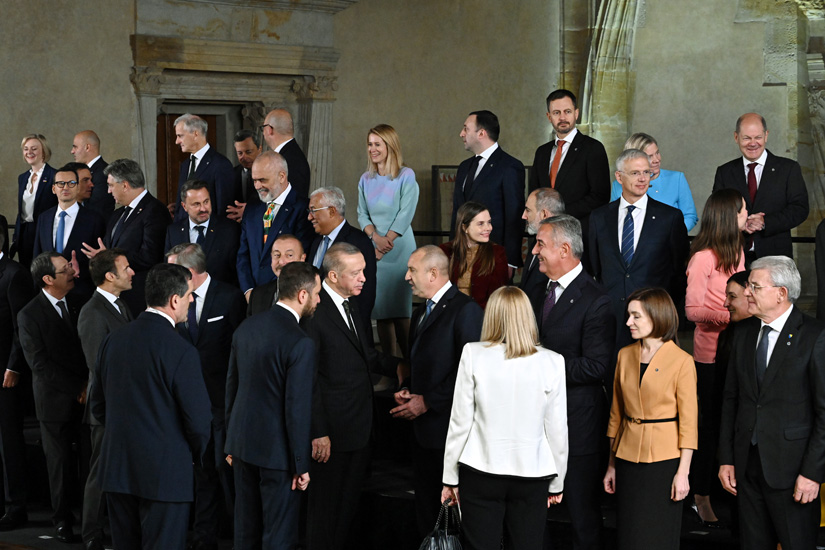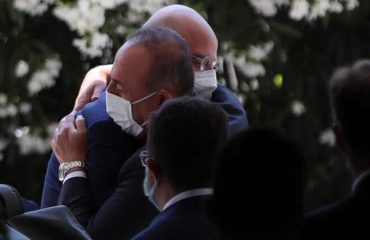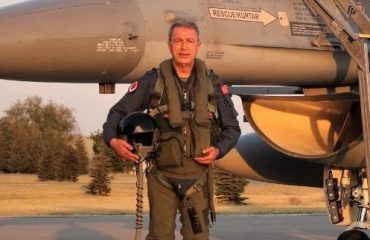

Russia’s invasion of Ukraine is forcing the European Union to enlarge, but Turkish politics are getting tougher. It is doubtful whether new formations such as the European Political Community, to which President Erdogan joined, will continue after the war. (Photo: Türkiye Presidency)
Russia’s invasion of Ukraine will soon pass ten months. This event not only disrupted the existing order in Europe set since the Second World War, but also caused global shocks. While the effectiveness of the United Nations and similar organizations established after 1945 had been questioned for a long time, this war launched by a Security Council member revealed how ineffective international organizations are.
On the other hand, this invasion was a wakeup call. As the European Union shook off its stupor, it gave a new purpose to NATO. Finland and Sweden, which have been EU members since 1995, have applied for NATO membership. In a way, this showed that being a member of the EU did not provide sufficient security. The Russia’s invasion and Putin’s dream of establishing a new Russian empire not only expanded NATO but also extended Russia’s borders with NATO by 1300 km.
Inevitable change in the EU
A new perspective has come to the enlargement of the EU, which has been on hold for a long time. The candidacies of the former Yugoslavia countries and Albania, which the EU defines as the Western Balkans (due to Bulgaria and Romania’s membership a new definition was created), are pending, albeit at various stages. The EU last enlarged nine years ago with the accession of Croatia. However, these countries did not have much expectation for membership to happen in a short time. When former EU Commission President Jean-Claude Juncker took office, one of the first things he said was that there would be no enlargement during his term (2014-19). In fact, any new membership was pushed into the background by changing the job description of the Commissioner responsible for enlargement to Neighbourhood and Enlargement. Accession negotiations with Montenegro, the most advanced among the candidates, were deliberately slowed down.
The EU, disappointed by the big bang enlargement in 2004, decided to act very cautiously on this issue. Stricter criteria began to be applied to new candidates due to the policies of Hungary and Poland and to some extent in the Czech Republic and Slovenia regarding fundamental rights and the rule of law.
Before Russia’s invasion
It seems that the effects of many former communist countries living in different systems for more than forty years did not disappear immediately, they did not share the same mentality as the former members, and there were fundamental deficiencies.
Later on, when the expected reforms in the Western Balkans slowed down due to the shrinking enlargement carrot and the negative influences of Russia and China were causing concern, Commission President Juncker had to visit the region and in a statement to Euronews at the end of his visit, he mentioned that a new enlargement could happen in 2025 at the earliest.
In fact, even before Russia’s invasion of Ukraine, the EU declared that it was uncomfortable with Russian, Chinese and even Turkish influence in the Balkans. However, Brussels could not take a step towards enlargement. This situation was a constant topic in various think tanks and the media. However, Turkey has always supported the membership of these countries to both the EU and NATO.
During my assignments in Ankara and Brussels, when I presented our proposals to my interlocutors in the Commission and the Council to cooperate together in this region, the EU never responded.
Russia’s attack prioritized EU enlargement
During the Slovenian Presidency, at the Western Balkans Summit held on 6 October 2021 with EU leaders and candidates other than Turkey, a possible date for enlargement was voiced. The date 2030 was pronounced by some candidate countries, but the EU did not want to make any commitments even for nine years later.
However, as a result of Russia’s attack on Ukraine, the issue of enlargement came to the fore again. Ukraine, and then Georgia and Moldova, applied for membership shortly after the Russia’s attack.
These three countries which are members of the EU’s Eastern Partnership were not even on Brussels’ enlargement radar. The Russia’s occupation and the brave resistance of Ukraine, Moscow’s threat to Moldova and the Baltics invalidated all previous perceptions. The European Council referred these applications to the Commission on 10 March 2022 for an opinion. While Ukraine’s candidacy was supported by Bulgaria, Czechia, Estonia, Ireland, Croatia, Latvia, Lithuania, Poland, Slovenia and Slovakia, others, especially the Netherlands, argued that it should not be rushed.
Georgia while Turkey was excluded
But in an extraordinarily short time, with the support of several EU members, including France and Germany, the European Commission gave the green light and recommended that Ukraine and Moldova be given candidate status and Georgia a European perspective. This proposal was accepted at the EU Summit last June. The importance of the candidacy is essentially symbolic rather than creating significant change. Although it is not possible to predict when both countries will join the EU, it will not be surprising that it will take decades. The European Commission probably felt that it would not be appropriate to immediately grant candidate status to Georgia, located to the east of Turkey, whose candidacy has been questioned from time to time due to geography. However, it was later announced that candidacy could be granted to Georgia when conditions are fulfilled.
North Macedonia, Bosnia Herzegovina, Montenegro
Returning to the Balkans, the earliest application for membership in this region is from North Macedonia (March 2004). Montenegro applied for EU membership at the end of 2008, Albania and Serbia in 2009, and Bosnia and Herzegovina in 2016. At the Summit held with the Balkan countries on 23 June 2022, the EU’s statements were far from satisfying these countries. Finally, on 6 December 2022, the Western Balkans and EU countries came together in Tirana, and support was given to the EU membership of these countries, but again, not even a possibility for a concrete date was announced. The result is complete uncertainty.
Tension between Serbia and Kosovo continues and the latest news is not encouraging. Apart from Serbia, five members of the EU do not recognize Kosovo: Greece, Romania, Spain, Slovakia and South Cyprus. This situation is a major element that hinders Kosovo’s progress on the path of accession. While resolving the name issue with Greece after many years, North Macedonia faced the obstruction of Bulgaria this time. Although Albania was granted candidate status in 2014, membership negotiations have not yet started since it is somehow tied to Skopje.
When there is no other option
It is in the interests of the parties that the EU determines its policy towards the countries in the Balkans as soon as possible. Although these countries know that they are not a priority for the EU, they still see their future as dependent on the EU because they have no other choice, but if this process takes longer, there is a possibility of a backlash. These countries do have several deficiencies in many areas and it is understandable that the EU does not want to repeat its problems it has with Bulgaria and Romania (such as not being included in the Schengen area because they did not make sufficient progress) with the other candidates. However, if the EU’s appeal is to continue, it should increase its interest in this region and take concrete steps.
On December 13, 2022, the situation of each candidate was evaluated in the EU General Affairs Council that deals with enlargement. In terms of some developments Bosnia and Herzegovina’s candidacy was also accepted. Kosovo remains to be the only country bereft of candidacy. As mentioned above, this will be difficult to overcome unless the five EU members recognize Kosovo. Nevertheless, as a consolation prize Kosovo has been granted visa-free entry to EU countries.
NATO, China, digital transformation
As the role of international organizations such as the United Nations diminishes due to political blockages, regional or ad hoc organizations are gaining traction. The United States may turn inward again after the Presidential elections in 2024. Despite its rhetoric, China’s stance may become threatening. Nobody knows if and when Russia’s aggression will stop. In addition to all these mostly security concerns, we all face climate change, excessive energy prices, high inflation, food security issues, the threat of immigration, new trade barriers and global health issues. We can also include the political apathy of the youth. Whether you like it or not, globalization is a phenomenon and its effects can be felt instantly on any subject. The internet and digitalization, once acclaimed as a means of providing information to the masses, are now seen as an additional threat with the spread of disinformation on almost everything. The uncertainty of the future provides ample reason for closer cooperation between NATO and the European Union, although its rules and objectives may differ.
Is European Political Community a solution?
EU enlargement since 2004 has increased challenges within the EU. During the negotiations, while the candidates were preparing for the EU, it was naturally not felt that the existing members should prepare for the new ones, yet it seems that it should have been done. The EU is thus taking extra care to not repeat this mistake. In this respect, there have been many debates over the decades about whether and how to change the EU’s decision-making system and how to accept new members. Concepts such as two-speed, two-stage, different geometry, à-la-carte Europe are not new, and they seem to be discussed again in many think tanks and in some EU capitals. In his speech at the European Parliament on the occasion of 9 May Europe Day, French President Emmanuel Macron spoke of a “European Political Community” (EPC) that would include both EU members and non-EU countries. This was mainly a reaction to Ukraine’s application to the EU. The EPC Summit which took place in Prague on October 6, was attended by not only the candidates but also the non-candidates such as Switzerland and the United Kingdom, with the exception of Belarus and Russia, seems be an opportunity for high level dialogue.
Will there be a EPC after the war?
The future hosts of this Summit, which is expected to meet twice a year, are Moldova, Spain and the United Kingdom, respectively.
How long the EPC will remain relevant will depend on whether it can function as a decision making mechanism as well as whether it is embraced by its members.
With the unexpected emergence of security concerns, it is in everyone’s interest to create a new structure in which countries with uncertain relations with the EU can participate. This does not mean that candidates should be included in a new formation simply because of their security and strategic importance. Ultimately, the main reason for unity is the adoption of fundamental values such as democracy, freedom of expression and the rule of law. In my opinion, for the EU the EPC is presented as an intermediate formula since EU accession will take a long time. On the other hand, it is difficult to predict in advance whether this formation that emerged after Russia’s attack will have a life once the war ends.
The EU’s look at Turkey
If we briefly touch on Turkey-EU relations within the framework of the decisions taken by the General Affairs Council on 13 December, it was stated that “Turkey remains a candidate country and is a key partner to many areas of joint common interest” . While the narrative about the other candidates begins with the situation in their accession negotiations, the section with Turkey immediately mentions the importance of easing tensions in the Eastern Mediterranean. It then highlights the need to implement the migration statement, underlines the decline in democracy, the rule of law and fundamental rights. In addition, the application of the Customs Union to all members (meaning Southern Cyprus) and the current problems of the Customs Union are mentioned. The call for Turkey to join the sanctions imposed on Russia by the EU is repeated, the Cyprus issue is handled within the framework of the known views of Southern Cyprus and Greece, and finally it is stated that “Turkey continues to move away from the EU and therefore accession negotiations have come to a standstill and no further chapters can be considered for opening or closing”.
In fact, the last sentence portrays the essence of the relationship. Of course, the question of why a Turkey moving away from the EU should comply with the EU’s decisions is not addressed. In short, the EU’s former political leverage on Ankara has waned.
The EU has no influence on Turkey
The EU has also criticized Turkey for its stance regarding Russia’s invasion of Ukraine. Turkey’s reaction to the invasion was limited in the beginning but quickly developed to condemning it at the United Nations General Assembly.
After Turkey designated the Russian invasion of Ukraine as a war it operated Article 19 of the Montreux Convention and restricted passage through its Straits. As such Turkey blocked passage of Russian warships from the Mediterranean to the Black Sea, except those returning to their bases.
Nevertheless Turkey did not participate in EU or US sanctions against Russia. First of all, Turkey is only obliged to comply with sanctions imposed by the United Nations. Secondly it is not convinced that sanctions in general work, although the extent and depth of these measures are unprecedented and already have a small impact. Turkey can also argue that the EU or the US did not consult it and is therefore not bound by these decisions. Even at the EU’s Gymnich meeting in Prague last August when the war was discussed with representatives from Ukraine, Moldova and Georgia participating, Turkey was not invited. (Gymnich meetings are the informal gatherings of EU Foreign Ministers held every six months, during each Presidency.)
Turkey has a key role in the war
Turkey has been trying to play the role of a mediator in this war. The personal friendship that President Erdoğan accumulated with President Putin over the years actually payed off. Senior officials from Ukraine and Russia met in Turkey twice and the most important development was the grain deal last summer. This has dented the Western criticism as President Erdoğan also gained some leverage over Putin regarding Syria. Turkey has also benefited from hard cash flowing in from Russian and Ukrainian citizens fleeing the war.
The Russian attack gave multilateral institutions new impetus. Now is the time to take this opportunity and seize the future. If Europe is to be a global player and to be taken seriously, a comprehensive discussion by all European countries is essential to reach common ground.
What will become of the EU?
As the common threats increase, it becomes very important to have a dialogue with everyone. Relations with Turkey are currently focused only on some foreign policy issues, but real dialogue with the aim of cooperation and coordination is not taking place. If Turkey is to comply with the EU’s common foreign and security policy, the EU must act accordingly. While emphasizing that Turkey is different from all other candidates on the one hand, is it not a mistake to not consult Turkey on an issue that directly affects Ankara, such as the Russia – Ukraine war? While Turkey has been pushing to open communication channels on several foreign policy issues for years, it is the EU that procrastinates. After all, if Brussels can determine what it wants, everyone will benefit.
If we turn the mirror to ourselves, we should agree that hostility towards the West does not benefit anyone. Diplomacy aims to establish good and tension-free relations with other parties in line with the interests of the country as much as possible. After a long break, it seems that Turkey has been making an effort to return to this policy since the end of 2020. If we can keep our statements and rhetoric within this scope, we will be able to benefit as well.

